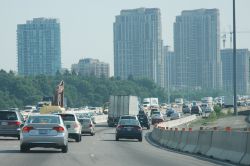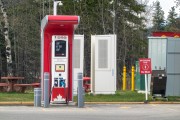When the carbon tax first reared its head in British Columbia it was a political hot potato. No one wanted to touch it and the public was vehemently against it. But despite being unpopular at the time, the carbon tax was implemented, and two years later the majority of British Columbians now support the measure.
Perhaps we can apply some of these lessons to the notion of road pricing in Toronto. I'm referring to last weekend's article in the Toronto Star that cites Mayor Ford's fierce objection to road tolls and a poll indicating that 65% of Torontonians are against it.
Support for the BC carbon tax increased once the public had experienced it in action and once they realized that they had even more money in their pocketbooks after tax returns, which is the benefit of a revenue neutral policy.
With this in mind, Harry Kitchen — a road pricing expert who was recently quoted in the same Star article — is right on the money when he suggests that a gas tax in the Greater Toronto Area (GTA) might be more palatable if every cent went to transit in the GTA and if we all knew that this was clearly the case.
Would gridlocked drivers be more willing to pay a fee to use a particular route if they knew that the funds were going directly to building a rapid transit line on that route — something that would benefit them and their families?
This was the case in Los Angeles, where policy makers started construction on a much needed light rail transit (LRT) line and earmarked a percentage of the sales tax to pay for it over time, while residents could witness exactly what their tax dollars were being used to build.
Simply blurting out the word "toll" and a politician can expect be met with opposition. That is, unless they look at all the possible options for road pricing and ways to implement these fairly.
 Strategies to raise money and/or reduce congestion on our roads could differ for drivers that currently have access to a rapid transit line (like a subway, LRT or GO Train) from those who don't. Along some routes a toll might make sense, along others perhaps HOT lanes — optional pay-to-use fast lanes — are best.
Strategies to raise money and/or reduce congestion on our roads could differ for drivers that currently have access to a rapid transit line (like a subway, LRT or GO Train) from those who don't. Along some routes a toll might make sense, along others perhaps HOT lanes — optional pay-to-use fast lanes — are best.
Extensive research in the US also shows that such pricing policies do not discriminate against low-income populations. In fact this demographic often works more than one job and gets paid by the hour; paying a fee to get out of gridlock and earn more money is widely supported by this sector of society.
What if pricing "sticks" were combined with "carrots" such as options to work at home for part of their week, 'buy-back' of company parking spots, or financial incentives for carpooling? In addition, what interest is there in policies such as pay-as-you drive insurance that enables drivers to leave their car at home a couple of times a week without feeling that they are paying twice — once for insurance and again for a subway token?
These are the types of options that we need to study and understand before jumping to polarized conclusions. Unfortunately, the superficial poll conducted for the Star does more harm than good: it presents simplified ideas with loaded terms and reinforces a black and white view of what the public will or will not accept.
We need a thoughtful study to help us find rational, fair and effective solutions to a very serious problem in the GTA, one that is crippling our city.
Waiting for the public to say "bring on the road tolls" is not going to happen. We need political champions to make tough but informed decisions that provide commuters with choices. The bell may not 'toll' for everyone, but careful study can find ways to get the wheels turning.





